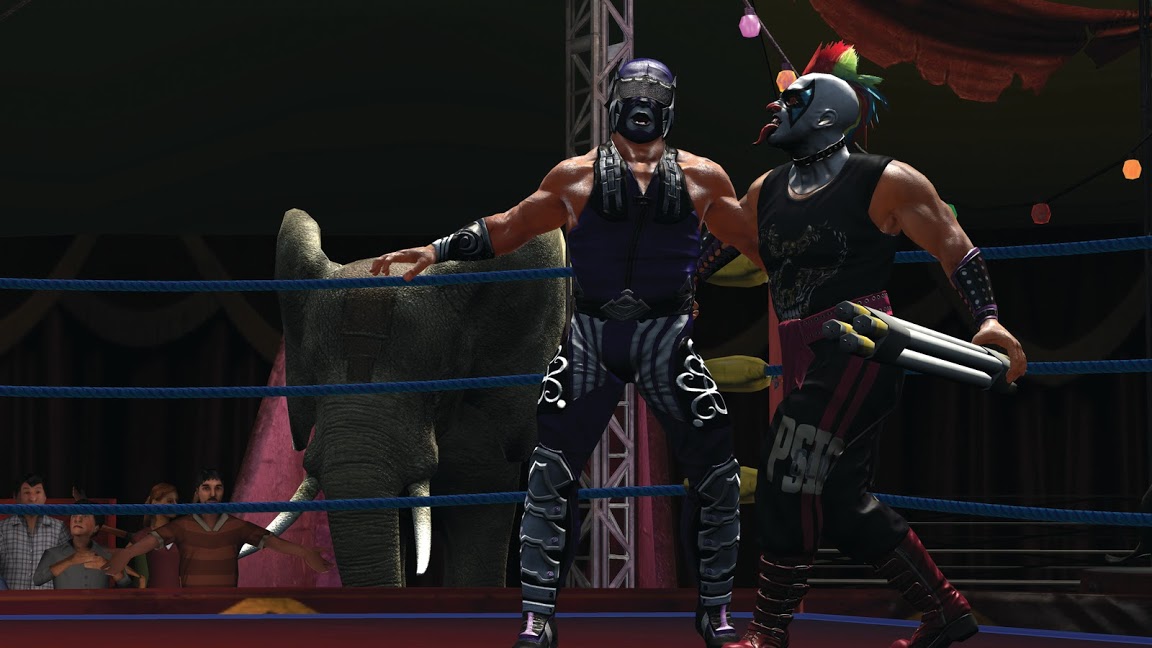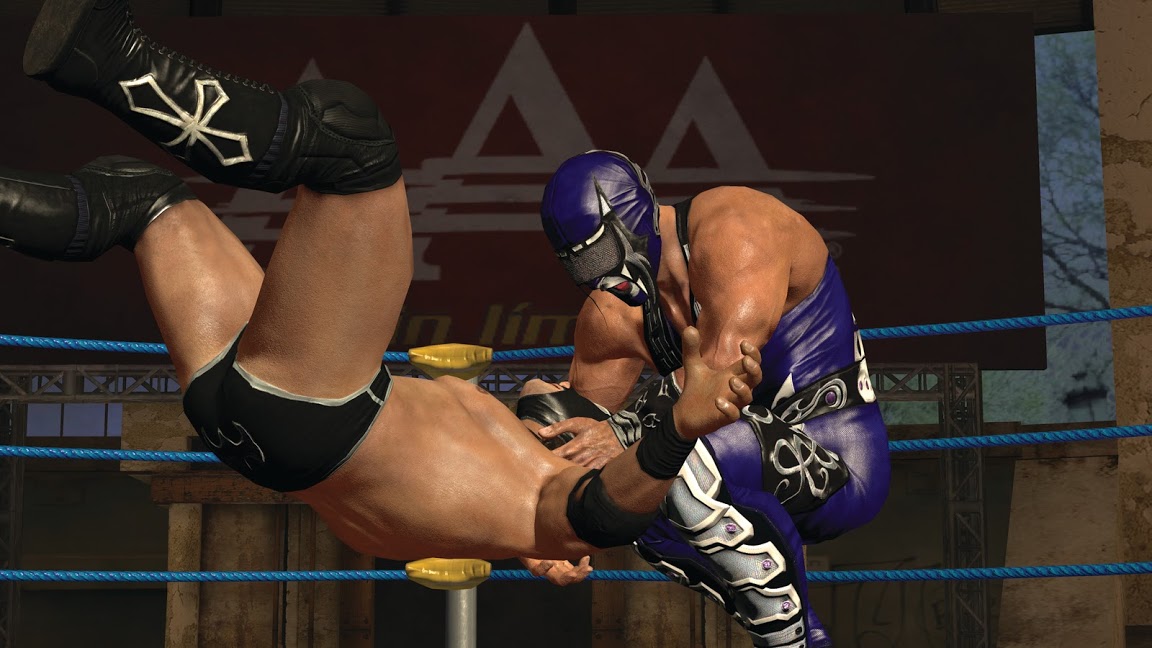This post has not been edited by the GamesBeat staff. Opinions by GamesBeat community writers do not necessarily reflect those of the staff.

The video-game-wrestling genre may get two flying boots to the backside with the launch of Lucha Libre AAA: Heroes del Ring, due out October 12, from Mexican publisher Slang (distributed by Konami in the U.S.) and developers Immersion and Sabarasa.
I had the opportunity to chat with Federico Beyer, a director at Slang, to discuss Heroes del Ring and the state of video games — and game development — in Latin America.
Juan Letona: Lucha Libre AAA: Heroes del Ring is the first game from Slang — what should gamers expect from the team? And why did you choose lucha libre as the subject of your debut title?
Federico Beyer: Actually, Slang is the first Latin American publisher — [but] everyone here has been involved with games for many, many years…Slang is basically a distribution company of video games in Latin America.
When our distribution business began, we asked ourselves, why aren't there video games produced locally, with local content, [but] shared with the rest of the world?
We realized the popularity of lucha libre, and [it was] a good way to put Slang out there…a great way to share Hispanic content to the rest of the world.
Lucha libre is the ancestry of wrestling, and what better way to communicate lucha libre than with Latin American studios? [After] talking to multiple worldwide studios, [we realized that] a Latin American studio was the way to go. At the end, we want to deliver fun video game content for gamers who are excited to experience something new.

JL: How far does the relationship go with the license, as in, did any of the AAA luchadores give input in the creative process? How many body slams and pile drivers did the developers have to endure to get the details just right?
FB: Triple A is the foremost league for lucha libre, with an MTV2 spinoff, Masked Warriors, shown in the U.S. And a lot of people are becoming fond of lucha libre in the U.S. They were involved in generating the story and the moves for all wrestlers. Lucha libre moves, and no wrestling moves.
Our game consists of some mo-capping and key-framing. The mo-capping efforts were done by our luchadores. The key-framing was supervised by the famous luchador El Apache. He was very, very involved in our process in making sure our moves were actually lucha libre moves. We would take out any non-lucha-libre moves. So we all made sure it was relevant to show to the rest of the world.
JL: I'm sure you and your developers had to attend a number of AAA matches for ″research purposes″ — what was the best or most amazing moment that you witnessed in a live match, and were you able to put that into the game?
FB: There are many, many amazing moments on my list…I have been to many "mega campeonatos" [title matches]; last year between Dr. Wagner and Electroshock was pretty amazing. My favorite luchador is Psycho Circus — super funny, always doing crazy stuff.
Lucha libre relates to the family here in Mexico. In any given match, you will see mothers with their children, or grandma with an umbrella hitting a luchador. One time, I saw, Psycho Clown running through the audience. When a mother gave [her] child to Psycho Clown for a photo op, Pyscho Clown put the baby's feet in his mouth and pretended to eat the child. It is a funny, different experience. These guys will risk themselves at all cost, which gives lucha libre an edge.
JL: Lucha libre is a cultural touchstone for Latinos — we had two of our famous luchadores, El Santo and Blue Demon, making movies way before Hulk Hogan was born. Is there a sense of orgullo (pride) behind the project?
FB: Yes, definitely. That existed since day one. Lucha libre is a great property to start sharing hispanic video games to the rest of the world. This will cater perfectly to [the Latino] market in the U.S. But not only that, we can broaden the market to gamers who love fighting games.
There are many elements that make the game rich and unique. Once you start hearing our announcers, see the gimmicks — you can't help but laugh. It is a different experience. We want to grow that fondness we have for lucha libre offshore and internationally.

JL: What moves, features, or wrestlers in the game do you think hardcore lucha libre fans will particularly appreciate?
FB: You will see different submission moves for each wrestler. Many of the moves you will not see anywhere else in the world. The high-flying moves that the acrobatic luchadores perform are in there as well. The one mode that will resonate with gamers out there will be Mask vs. Hair. You build your wrestler from scratch, with different varieties and customization. It's very difficult to make the same mask twice.
You can customize every single move of your character. We have seen gamers take 30-40 minutes in customizing a luchador. It is pretty robust. So taking one of your luchadores to an online [Mask vs. Hair] match, and losing, you are waging an investment in the game. The mask is completely gone, but if you win three ranked matches, you gain the ability to make another mask. But what is lost is lost.
JL: Many North Americans don't know much about lucha libre besides what they saw in the movie Nacho Libre — are any characters from that movie going to be in the game?
FB: Nacho Libre is a great movie and [I] appreciate Jack Black, but it is just a comedic take on lucha libre. What we offer is all major characters from the AAA license. Very important in our title is the rudos and tecnicos (bad vs. good), and a great story mode [with] 22 stages. As you move on the storyline, you start unlocking luchadores who will be [playable] in exhibition mode.
JL: Can I play as El Apache through the story mode campaign?
FB: You will have to create your own wrestler and play through the campaign. If you are a rudo [a heel], as you complete the story mode other luchadores will unlock. So if you beat the story mode as a rudo, tecnicos [good guys, or 'faces'] will unlock as you defeat them in the storyline.
Our game includes some tidbits of lucha libre history — movie clips within the game to [help show gamers] what the true lucha libre is about, and what is going on the arena here in Mexico, the background of the story, all of that is communicated in the storyline.

JL: What steps can publishers take to encourage the creation of games outside of the traditional Japanese, American, and European markets?
FB: Latin America has a lot to provide to the gaming community. We Latinos have a sense of humor and creativity, and that hasn’t been exploited as much as it should. In Mexico, we make fun of death — November 2, Dia de La Muerte, we celebrate our relatives and we throw parties, and put out items that our dead relatives liked.
My grandpa used to enjoy a bottle Mezcal, [so] the family will drink with him. In relating that to our game, we have La Parka, who plays the Grim Reaper — he's always pulling pranks, dancing, and being comedic to other wrestlers.
It is uniqueness that only a Latino could come up with in so many ways.
JL: One of my favorite games was Grim Fandango, which has that macabre feel, but the game was created by an American, and I imagine if a Mexican director had created that, how different it would be.
FB: One of the great games….
JL: Heroes del Ring comes out in a few days. What's next?
FB: Just having the game shipping is fantastic, like the birth of a child. We worked on this game for three years now, and it is an amazing experience to see the birth. We look forward to our launch and hope for gamers to start enjoying it. And do expect future projects from Slang and our studios. We are producing some and evaluating others as well, and these we will reveal in good time!
